Picking the right equine supplement is tricky, at best. It’s cost prohibitive to have the products certified by the government, so horse owners are left guessing which products actually contain the ingredients listed.
In the equine nutraceuticals space, the Canadian-owned company Herbs for Horses has been ahead of the curve for as long as there’s been a curve. Since 1997, this innovative, integrity-centred business has sought out and developed healthful, scientifically-validated solutions for the modern horse and have conscientiously invested in independent, objective scientific testing for its equine supplements to ensure their efficacy.
Ralph Robinson, Herbs For Horses owner, explains, “What makes Herbs for Horses unique is that, since our inception, we have stayed fully committed to our vision: to blend our ancestral resource of medical plants with contemporary objective scientific testing. While other companies claim that their products are ‘backed by science’, there are very few that actually conduct independent research studies on their products.”
Dr. Wendy Pearson, Ph.D., company advisor and assistant professor at the University of Guelph, continues, “Even fewer companies in the field of equine supplements can confidently say they have invested an average of $50,000 per year into research into the safety and efficacy their own products over the past 20+ years. So when you purchase Herbs for Horses products, you are buying products that have developed from years of objective research.”
Following are just some of the studies conducted on their products over the last several years, several also provided valuable funding for PhD and MSc students:
Mobility – The subject of the very first study undertaken by Herbs for Horses way back in 1997. Conducted at the Equine Research Centre at the University of Guelph in partnership with the National Research Council, it showed that Mobility reduced production of chemicals associated with pain and inflammation in a group of horses with naturally-occurring arthritis. This paper was published in the Journal of Nutraceuticals Functional and Medical Foods in 1999. More studies on Mobility were conducted between 2004 and 2007 to ensure that raw ingredients sourced from a new supplier did not impair the effect of Mobility on cartilage and were later later published in the Journal of Veterinary Pharmacology and Therapeutics.
UTP – In 2005, 30 actively racing thoroughbred horses at Woodbine and Fort Erie racetracks diagnosed with gastric ulcers received UTP or a placebo for 30 days. Comparisons of gastroendoscopy before and after treatment showed a significant decline in ulcer score in UTP-treated horses, with endoscope scores below that considered to be ‘clinical’. Another related study in the Department of Animal Biosciences at the University of Guelph using an organ culture model of gastritis found that treatment of smooth muscle from pigs with UTP significantly reduced contractility of the muscle strips, indicating that UTP has a spasmolytic effect which could explain some of the benefits seen in horses with ulcers. This paper was published in the Journal of Animal Physiology and Animal Nutrition in 2020.
Rutin – This 2005 study evaluated the effect of Rutin on actively racing thoroughbreds with a history of EIPH. Conducted in partnership with Roger Attfield, 7 horses received Rutin or a placebo for 28 days. Endoscopy of the lungs after racing both prior to and following treatment with Rutin demonstrated that the product virtually eradicated signs of bleeding following racing, compared with a placebo.
Breathe –Also at the Equine Research Centre in partnership with the National Research Council, horses with naturally-occurring ‘heaves’ had a lower respiratory rate and reduced pulmonary pressure after just 7 days on Breathe ‒ an improvement over untreated control horses which lasted the duration of the 21-day study. The research was published in the Canadian Journal of Veterinary Research in 2007.
Nasprin – This study in mice was conducted at Nucro-Technics Contract Testing Laboratory in 2014 in order to confirm the safety of Nasprin during pregnancy. Low and high doses of nasprin were fed to female mice prior to, during, and after pregnancy, and demonstrated that Nasprin is without measureable adverse effects in either the dam or the babies.
Calm and Collected – This 2017 study compared the calming effect of Calm and Collected with a common anxiolytic drug (acepromazine) and a placebo. A group of horses wearing a heart rate monitor were put through a variety of tasks ‒ walking onto a trailer and a weighscale, giving a blood sample, walking into a stall containing an unfamiliar object, and going on a trailer ride. It was found that the horses’ heart rates and blood levels of the stress hormone cortisol were lowered by Calm and Collected to the same degree as acepromazine, and significantly lower than the placebo.
Hyalcare – This very interesting study showed that Hyalcare has a remarkable ability to prevent cartilage breakdown during an inflammatory event, providing strong evidence for its importance in slowing the progression of arthritis. This study was published in the Journal of Veterinary Pharmacology and Therapeutics in 2008. As part of this work, the arthritis model was used to screen potential bioactive ingredients, and curcumin was identified as a strong anti-inflammatory and promotor of ‘autophagy’ (a process by which damaged cells are ‘cleaned up’ by the body). This study was published in BMC Complementary and Alternative Medicine in 2020, and was used to further develop the anti-inflammatory activity of Hyalcare.
ProbioPLUS – Current research is under way at the University of Guelph in partnership with the Natural Sciences and Engineering Research Council. Part of this work is evaluating the effect of including ProbioPLUS in a ‘robogut’ model of the equine hind gut to help clarify its role in stabilizing hindgut pH and promoting growth of a healthy microbiome. A second study is evaluating the effect of dietary ProbioPLUS in actively racing Standardbred horses receiving oral antibiotics. Results of these studies are expected early in 2021.
To view the entire line of Herbs for Horses natural herbal supplements, read the related research, or find a retailer near you, go to www.HorseHerbs.com.

